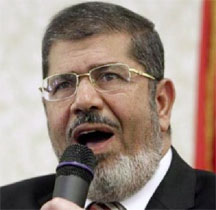CAIRO, (Reuters) – President Mohamed Mursi came to office promising to be a president for all Egyptians. A year into his term, the divisions deepened by his rule have pitched the nation into crisis.
As Mursi’s opponents mobilise for protests aimed at toppling him, the Muslim Brotherhood man shows no sign of flinching. Instead, he is digging in, backed by Islamist allies determined to shield Mursi from what they see as an attempted coup.
That he should battle on regardless, fending off a storm of criticism which he says is personally hurtful, reflects Mursi’s approach during a year in which his efforts have been obstructed by political unrest, resistance from vested interests within the state and failures by a government that seems to lack vision.
As hopes for consensus have faded, Mursi has ploughed on regardless, casting his opponents as spoilers who have rejected his attempts at outreach. His allies, meanwhile, have been whittled down to Islamists at the extreme religious right.
Addressing his supporters on Wednesday, Mursi said the conflict threatened “our nascent democratic experience and threatens to put the whole nation in a state of paralysis and chaos”. In a pattern seen before, he offered concessions, but these were dismissed as too little by the opposition.

“I say to the opposition: the road to change is clear,” he said, alluding to elections won by the Islamists to date. A determined man of action to his supporters and a would-be despot to his opponents, Mursi, 61, is a civil engineer and university lecturer with a doctorate from the United States. He was raised in a rural village a two-hour drive north of Cairo.
He was thrust into the presidential race when the Brotherhood’s first-choice candidate was disqualified. Dismissed at first as the “spare tyre”, he has grown into his role, appearing ever more confident in his public addresses.
Leaning over the podium and digressing from his written remarks during a nearly three-hour speech late on Wednesday, Mursi sought to appeal to ordinary people with a folksy style that departed from stiffer habits that were often mocked.
“He knows his primary audience is not opposition supporters or secular-minded urbanites,” said Yasser El-Shimy, Egypt analyst with the International Crisis Group.
When he took office, the extent of his authority was thrown into doubt by the role of Hosni Mubarak-era generals who had established themselves as a rival source of authority.
Yet the novice president stunned observers in August when he sacked Mubarak’s veteran defence minister, a move that drew grudging respect from some critics, even in the liberal camp.
